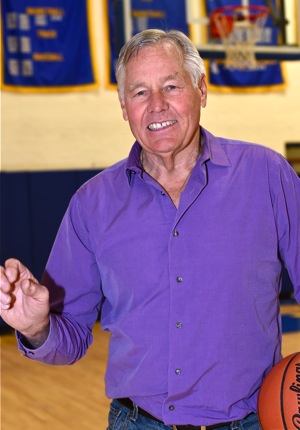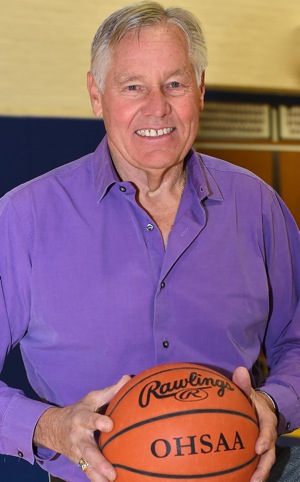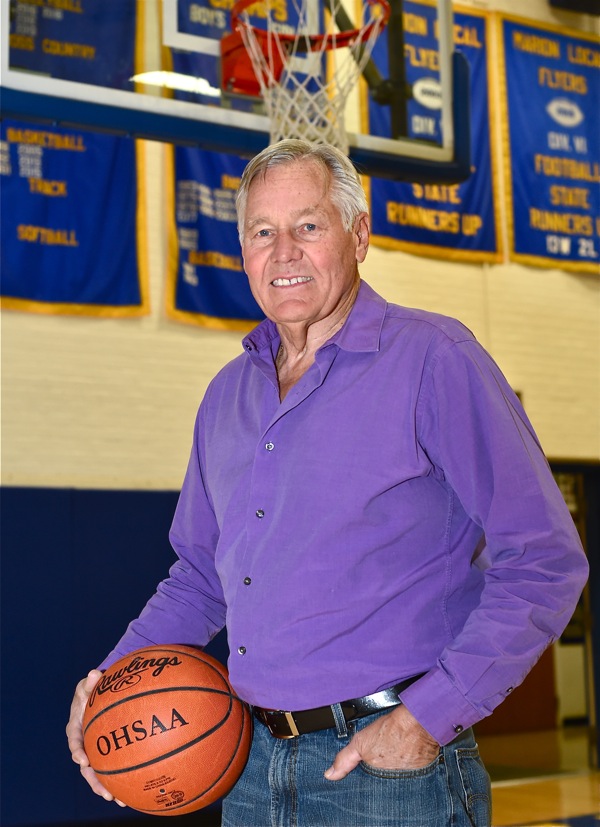If you want the politically correct response on life…don’t ask. But if you want an honest opinion about the modern game of basketball – at all levels – just ask former Marion Local head coach Jack Albers. If you know him you won’t be surprised. He’s more than willing to share!
 When we published our July, 2017 column on former Marion Local basketball coach and teacher Jack Albers, it ended up being the second-most read personal profile in the six-year tenure of this website – second only to current Marion Local head football coach Tim Goodwin (July, 2014).
When we published our July, 2017 column on former Marion Local basketball coach and teacher Jack Albers, it ended up being the second-most read personal profile in the six-year tenure of this website – second only to current Marion Local head football coach Tim Goodwin (July, 2014).
It seemed everyone who played for him, or who sat in his math class at Marion (and later Lehman High School), wrote us to share an opinion about their experience with ‘Mr. Albers’.
Some said their experience was intimidating, such was his demanding attitude about making the most of life and the opportunity to be educated, on the court or in the classroom.
Others (and most), however, said that their time with Jack Albers was the most challenging, and formative, in their adolescent lives.
“You never wondered where you stood with him,” said a former student from Marion.
“He scared the hell out of me,” said another from Lehman. “But he was the best teacher I ever had. I sure learned Algebra.”
But everyone agreed…that like him or not, Albers was the most honest, and opinionated, personality they met in their educational experience; and including college, some said.
 His ability to communicate and impress the importance of his subject led some students to become successful educators in their own right.
His ability to communicate and impress the importance of his subject led some students to become successful educators in their own right.
His ability to teach and strategize the game of basketball taught others to experience competitive success that still serves them in their professional careers.
His knack of dictating the terms of learning, and competing, are legendary. Ask any basketball official. Albers ALWAYS demanded accountability, and everyone’s best effort!
He hasn’t changed. Now retired, Albers is still interested, vital, and a frequent visitor to area gyms to watch and evaluate high school basketball. And his career accomplishments of 290 wins and 14 consecutive sectional tournament titles at Marion Local qualify him, over many others, to render an opinion on the game, its direction, and the future of basketball at all levels.
And so we asked Jack Albers to sit down for a follow-up visit to our interview in July…to speak on the subject of what’s wrong (or right) about modern basketball. Those who know him best won’t be surprised. He was more than willing to share.

“The individualism is irritating to me. When it’s one on one it not enjoyable to watch. Even teams that lack individual talent can win against teams that have it…because they work as a unit and don’t try to play beyond their limitations.”
PPM: Jack, what’s the one thing that strikes you most about modern basketball – to watch, or how its played?
Albers: The individualism is irritating to me…the lack of a team concept. When it’s one on one it’s not enjoyable to watch. When I see good team offense, or good team defense…where the communication between all five players is good, and with that sense that each of the five knows what the other is going to do, that’s so enjoyable to see. I really enjoy the chemistry that’s vital for good team play, and it’s lacking in modern basketball. Even with LeBron James and the highest level of basketball, when everything else breaks down and you’re up against the time clock to get a shot off that’s not fun to watch. Even teams that aren’t that talented can perform well as a team sometimes and actually beat others that are more athletic and more skilled, individually. They can do that because they work as a unit and don’t try to play beyond their limitations. People complained about the lack of scoring at last year’s state tournament, but I enjoyed it because I recognized the commitment and chemistry of some good team defenses. That was very exciting to me, and fun to watch.
PPM: The one complaint that I hear from generational basketball people is that modern players can’t shoot the ball like they used to – that free throw percentage is awful because kids don’t take it seriously. What do you have to say…about shooting?
Albers: Well, without a question the three-point line has had a devastating impact on modern basketball in terms of shooting and kids’ shooting technique. What you have is kids trying to shoot the three at too young an age, they have horrible form because they lack the strength to shoot with good technique, and they develop bad form and bad habits. And, they spend too much time trying to shoot from range beyond their ability instead of working on the higher percentage shots closer to the rim. Then, as they grow older and get into high school ball coaches don’t take the time and trouble to teach them proper technique and break those bad habits. For this reason you have young players who can’t shoot free throws because they don’t have a sound, repeatable shooting motion. The other issue is that because they play multiple sports, which I’m fine with, they don’t shoot enough. The three point shot has made basketball more exciting, but the players that grow up being good shooters have good form and they shoot the basketball all year ’round.
PPM: It seems to be about 50-50 among basketball people over whether AAU has helped or hurt the game in terms of sound fundamental basketball being taught. Your thoughts on fundamental basketball?
Albers: I remember back in my coaching career when they opened up summer team play when the kids could play without benefit of coaching. You could go watch them, but you weren’t allowed to coach. Then, later in the year when we’d take those kids to camp in Cincinnati and I was horrified by the bad habits they had gotten into on their own time. Everything I’d worked to create during the year had been destroyed. I had to leave the gym. And after the day was over I got the kids together and told them…that they had contradicted everything I had taught them during the previous year. And one of those kids said to me, “Coach, it’s summer. We want to have fun.” And I told them…if you want to have fun you gotta’ get a different coach. Because if we continue to play this way when the season begins I know we’re going to get drilled – we’re going to get our butts kicked by 30 points a night. If they want to have fun, they have to play the game the right way You play with sound fundamentals to eliminate the mistakes and turnovers. You play to be successful as a team and you play the game the right way.

“I always told parents…we’re all on the same ship. If you shoot at me, or one of your son’s teammates, you’re shooting at our ship. And you’re going to sink us.”
PPM: Where is the point where the line is crossed between parents and coaches? A lot of coaches tell me the number one issue with the job being more enjoyable is dealing with parents over perceived slights and playing time.
Albers: One of the things that I did was call the parents together at the start of the year and tell them, “We’re all on the same ship.” The ship is attempting to sail successfully through the season, and you can shoot at me as a coach, but you need to remember that I’m on that ship with your son. You can shoot at one of your son’s teammates, but when you do you’re shooting at the ship that’s carrying your son. I would tell them that I never allowed a kid to blame an official, a teammate, or a coach because that’s an absolute loser that does things like that. Instead, winners look in the mirror and ask themselves what they need to do to help their team win. We’re not going to win every game, but you still have to do what you can to make a positive contribution. And I believed that any parent was either part of the problem, or part of the solution. Now they can complain about the coach, but they’d better to do it behind closed doors. Because if you say it in front of your kid…you’re shooting at our ship. And you’re sinking us. Now that’s strong talk, but that’s what I believe.
PPM: You mentioned earlier the issue of individualism and selfishness in modern culture and modern basketball. How do you combat that as a coach?
Albers: Whenever I saw that as a coach I jumped on it right now. You have to recognize it as a coach, and if a player was going to act with selfish, or envious behavior I showed them the door. I didn’t give them any other option. Now I know there are some coaches that don’t want to confront that, but what other option do you have. You’re not going to win anyway, so why allow having a selfish player on your team? It’s going to break you down, destroy your chemistry, and all the connections that are necessary for success.
PPM: There is such a movement afoot now in the name of sportsmanship. Technical fouls are frowned upon, and if you get ejected you’re fined, suspended for two games, and have to take anger management classes online? What is good sportsmanship, and are technical fouls an ejections necessarily a bad example for amateur players?
Albers: Well first of all, I believe true sportsmanship is about having respect for competition…good, hard, clean competition. Having respect for an opponent who wants to win as badly as you do, works hard, and plays the game the right way. As far as technical fouls are concerned…there are times when your team is simply flat and the only way to wake them up, or bring them to a more competitive level, is to show some competitive fire as a coach. It can have a positive effect on your team. You should coach and play to the fullest level of your abilities and emotions. That’s all it is, and I’ve gotten my share of them. In fact I had a reputation for getting them and there were instances when young officials would come into a game with a priority to assess me a technical foul as soon as there was an opportunity. But largely, it’s gamesmanship, and if your kids realize that there’s nothing wrong with it, or unsporting about it. As far as the fines and suspensions, I’m not in favor of either.
PPM: Has the game gotten too physical? Is it too rough? I hear a lot of fans question now that they don’t understand when contact is a foul and when it isn’t. So the question to you is…has the game gone too far?
Albers: Well, I don’t like a ‘wuss’ game. I don’t like watching a game where every contact is assessed a foul. I like the idea of allowing some physical contact because the game becomes a bore to watch without it. There needs to be some contact because the kids need to respond to it a little bit. Now as coach I knew the officials well enough after coaching for several years to know how much contact they were going to allow before they blew the whistle. And they were pretty consistent. They were pretty good officials. And I would coach my players as to how much contact they were going to put up with. With some I’d tell my players that it’s going to be pretty physical inside so you’d better respond accordingly. With others I’d warn them that they were going to call ticky-tack fouls on the perimeter. Don’t be reaching in because it’s going to get called. Now, is there a limit? Absolutely. But when the game gets too physical it’s up to the officials to recognize and rein things back in by blowing the whistle. But yes, some contact is good for the game, for the players, and for the fans who are there to watch it. The game is faster now, more athletic, and that’s a good thing.

“You see a lot of girls with good shooting form because they know they lack the range to stand too far from the basket and be effective. And, because they start playing later than the boys they don’t develop as many early bad habits.”
PPM: What’s your assessment of the girls game, and how relevant is it in comparison to the boys’ game?
Albers: It’s a different game, because they have different physical limitations. And I’ve had people tell me, ‘Thank God you coached the boys’, because they believed I would have been too intense for the girls game. But I do like sound fundamentals and I think the fundamentals are essentially the same. And because of some of the limitations you see some girls who focus more on the fundamentals than boys, particularly with shooting. You see a lot of girls with good shooting form because they know they lack the range to stand too far from the basket and be effective. So you coach with a little different perspective than you do with the guys. I personally think it’s a good game to watch, particularly with the good college teams, and I think the smaller ball presents a shooting advantage for them. But generally, they know their limitations and they play within their limitations with sound fundamentals. And, because they start playing later than the boys do they don’t develop as many early bad habits.
PPM: I know your grandson plays and I wondered if you enjoy watching him as a spectator…or do you find yourself getting emotionally involved with the game as you would have as a coach?
Albers: No, I enjoy watching him play because he’s a pretty sound fundamental basketball player who plays within in his limitations. I don’t get tense over watching him, but we do work together sometimes and I offer some suggestions. But he likes the game, works at it, and occasionally he’ll have one of those nights where he’ll have a breakout game offensively. He enjoys the competition and he has fun with it. That’s all you can ask for.

Jack Albers won 290 games in 18 seasons as coach at Marion Local, including 14 consecutive sectional tournament titles. (Press Pros Feature File Photos)



